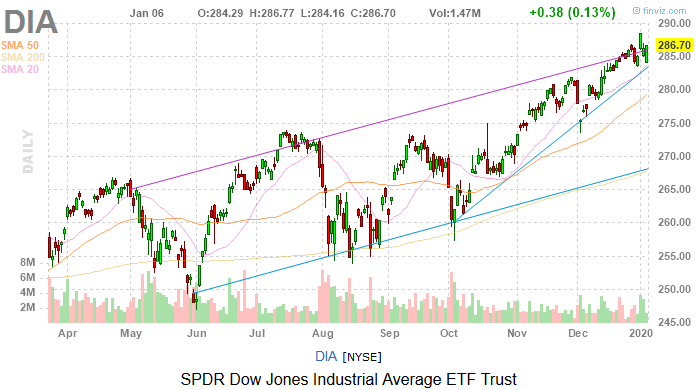The widely followed domestic equity benchmarks were able to cobble together modest gains Monday even though many market participants are taking a wait-and-see approach to what comes next amid heightening hostilities between the U.S. and Iran.
day
- The S&P 500 started the week higher by 0.35%
- The Dow Jones Industrial Average inched up 0.24%
- The Nasdaq Composite added 0.56%
- After disappointing last Friday as oil prices rose on the back of the Iran headlines, Exxon (NYSE:XOM) was one of the leaders on the Dow Jones today, gaining 0.77%
As was often the case in the latter stages of 2019 when trade dominated the headlines, whenever there were days lacking macroeconomic or stock-specific news, market participants were apt to turn their attention to geopolitical headlines.
That was the case today.
With the Iran situation being volatile at best, that’s likely to be the issue du jour until traders have reasons to look elsewhere. Fortunately, there will be some near-term relief on that front as Federal Reserve members Richard Clarida, John Williams, James Bullard and Charles Evans deliver remarks on Thursday followed by the December employment on Friday.
In late trading Monday, just 10 of the Dow’s 30 members were in the green and Exxon Mobil was just one of two higher by at least 1%.
Boeing Bonds
Boeing (NYSE:BA) was one of the Dow winners today, albeit in modest fashion after the company said it’s mulling a corporate bond offering, prompting some market observers to opine that the capital-raising move is aimed at shoring up dividend sustainability.
Boeing, which currently yields 2.47%, has boosted its payout every year since 2011. Yes, dividend investors can find longer dividend increase streaks among Dow members and across U.S. benchmarks, but that streak is now long enough that Boeing shouldn’t want to jeopardize it. Due to its strong balance sheet, Boeing likely won’t have to do much in terms of enticing bond buyers.
“Bond investors reflected the strength of the balance sheet in the yield demanded on Boeing bonds,” according to Barron’s. “Debt issues by Boeing this past summer yielded about 2.6%, less than 1 percentage point above the 10 year U.S. treasury yield, in line with the safest corporate bonds.”
No More Fun
McDonald’s (NYSE:MCD) was one of the other Dow names hovering around a 1% gain to start the week. Underscoring just how important corporate culture and workplace environment have become, the catalyst for today’s pop in McDonald’s stock may have been word from new CEO Chris Kempczinski that major cultural changes are coming at the world’s largest burger chain.
Following the ouster of former CEO Steve Easterbook in November amid allegations that he carried on a consensual relationship with a female subordinate, McDonald’s culture has come under scrutiny.
“We must now champion and apply them more evenly across the three-legged stool to be even stronger,” said Kempczinski.
Defensive Winner
With investors matriculating to some defensive names today, UnitedHealth (NYSE:UNH) got a lift, but there was more to the positive story. Morningstar was out with a bullish note on managed care providers today, one that indicates the odds of Medicare For All coming to life are long.
“In a Medicare for All scenario where U.S. insurers have no place in the U.S. insurance market, private insurers’ operations could be in jeopardy,” said the research firm. “However, we believe this scenario represents a very low-probability risk (5% or less) within our 10-year forecast period, as it would require significant shifts in current federal government control, including a filibuster-proof Democratic majority position in the Senate and a new president from the left wing of the Democratic Party, as Republican voters remain significantly opposed to such a plan.”
Bottom Line on the Dow Jones Today
Several times toward the end of 2019 I highlighted the need for investors to prepare a bit for the fourth-quarter earnings season, which will soon be upon us. The bad news is that the bottom-up S&P 500 earnings for Q4 has come down 4.7%.
“During the past five years (20 quarters), the average decline in the bottom-up EPS estimate during a quarter has been 3.3%,” notes FactSet. “During the past 10 years (40 quarters), the average decline in the bottom-up EPS estimate during a quarter has been 3.1%. During the past 15 years (60 quarters), the average decline in the bottom-up EPS estimate during a quarter has been 4.4%. Thus, the decline in the bottom-up EPS estimate recorded during the fourth quarter was larger than the five-year average, the 10-year average, and the 15-year average.”
This is probably priced into stocks right now, meaning there will be some burden on companies to reveal upbeat guidance for the current quarter and year when given the opportunity.
As of this writing, Todd Shriber did not own any of the aforementioned securities.
